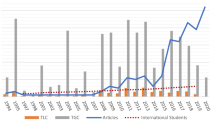Abstract
In this increasingly globalised age, ideas developed in different cultures and countries can be disseminated very rapidly, which is supposed to allow people who live in different cultures to exchange information and learn from each other easily. However, the process of adapting educational ideas developed within one culture for use in another should be slower because education is very complex and there are a great many factors that must be considered. In particular, it is necessary to consider human psychology in relation to differences between the two cultures and their traditions, including things such as teachers’ beliefs, teaching practices, students’ motivations and interests in learning, and the educational values held by various stakeholders (e.g. school rectors, politicians, parents, and researchers). Therefore, more comparative studies are needed to promote teaching and learning internationally. This article builds on the study on science education presented by Hằng et al. (Cult Stud of Sci Educ. doi:10.1007/s11422-014-9634-8, 2014) and highlights three issues of relevance for science educators and science educational researchers who seek to implement educational ideas from one culture in another. The first is the importance of conducting comparative studies that will facilitate the development of educational practices in modern multi-cultural societies. Second, I discuss issues with data collection and the interpretation of results, with particular reference to the work of Hằng et al. (2014). Third, given the emerging focus on comparative studies in education, I discuss the important roles of teachers in such efforts and offer some advice on working in collaboration with them in a way that will enable them to develop their professional knowledge and teaching practices. I present three different approaches (action research, design-based research and learning study) that are currently used in teacher professional development programs and which may be useful for teacher educators to consider as means of increasing teachers’ professional knowledge. Hopefully, this article will encourage researchers to conduct improved comparative studies in science education in the near future and thereby benefit science teaching and learning globally.


Similar content being viewed by others
References
Beck, C., & Kosnik, C. (2006). Innovations in teacher education—A social constructivist approach. New York: State University of New York Press.
Broadfoot, P. (2000). Comparative education for the 21st century: Retrospect and prospect. Comparative Education, 36(3), 357–371. doi:10.1080/03050060050129036.
Bulte, A. M. W., Westbroek, H. B., De Jong, O., & Pilot, A. (2006). A research approach to designing chemistry education using authentic practices as contexs. International Journal of Science Education, 28(9), 1063–1086. doi:10.1080/09500690600702520.
Cohen, L., Manion, L., & Morrison, K. (2011). Research methods in education (7th ed.). New York: Routledge.
Drechsler, M., & Schmidt, H.-J. (2005). Textbooks’ and teachers’ understanding of acid-base models used in chemistry teaching. Chemistry Education Research and Practice, 6(1), 19–35. doi:10.1039/b4rp90002b.
Edelson, D. C. (2002). Design research: What we learn when we engage in design. The Journal Of The Learning Sciences, 11, 105–121. doi:10.1207/S15327809JLS1101_4.
Epstein, J. L., & Sanders, M. G. (2002). Family, school, and community partnerships. In M. H. Bornstein (Ed.), Handbook of parenting (Vol. 5, pp. 407–437)., Practical issues in parenting Mahwah, NJ: Erlbaum.
Hằng, N. V. T., Meijer, M. R., Bulte, A. M. W., & Pilot, A. (2014). The implementation of a social constructivist approach in primary science education in Confucian heritage culture: The case of Vietnam. Cultural Studies of Science Education. doi:10.1007/s11422-014-9634-8
Holmqvist, M., Gustavsson, L., & Wernberg, A. (2008). Variation theory: An organizing principle to guide design research in education. In A. E. LKelly, R. A. Lesh, & J. Y. Baek (Eds.), Handbook of design research methods in education: Innovations in science, technology, engineering, and mathematics learning and teaching (pp. 111–130). New York: Routledge.
Holmqvist, M. (2011). Teachers' learning in a learning study. Instructional Science, 39(4), 497–511. doi:10.1007/s11251-010-9138-1.
Mamlok-Naaman, R., & Eilks, I. (2012). Different types of action research to promote chemistry teachers’ professional development—A joint theoretical reflection on two cases from Israel and Germany. International Journal of Science and Mathematics Education, 10(3), 581–610. doi:10.1007/s10763-011-9306-z.
Mikk, J. (2000). Textbook: Research and writing. Frankfurt am Main: Peter Lang.
Robson, C. (2011). Real world research (3rd ed.). West Sussex, UK: Wiley.
Shulman, L. S. (1986). Those who understand: Knowledge growth in teaching. Educational Researcher, 15(2), 4–14. doi:10.3102/0013189X015002004.
Stenhouse, L. (1962). Educational decisions as units of study in an explanatory comparative education. International Review of Education, 7, 412–419. doi:10.1007/BF01421346.
Stenhouse, L. (1967). Culture and education. London: Thomas Nelson.
Stenhouse, L. (1979). Case study in comparative education: Particularity and generalisation. Comparative Education, 15(1), 5–10. doi:10.1080/0305006790150102.
van Bommel, J. (2012). Improving teaching, improving learning, improving as a teacher: Mathematical knowledge for teaching as an object of learning. Doctoral thesis. Karlstad: Karlstad University.
Villegas-Reimers, E. (2003). Teacher professional development: an international review of the literature.: UNESCO: International Institute for Educational Planning.
Yoon, K. S., Duncan, T., Lee, S. W., Scarloss, B., & Shapley, K. L. (2007). Reviewing the evidence on how teacher professional development affects student achievement. Issues and Answers Report, REL 2007–No. 033 (pp. 55). Washington, DC: U.S. Department of Education, Institute of Education Sciences, National Center for Education Evaluation and Regional Assistance.
Author information
Authors and Affiliations
Corresponding author
Additional information
Lead editor: P.-O. Wickman.
This review essay addresses issues raised in Ngô Vũ Thu Hằng, Marijn Meijer, Astrid M. W. Bulte and Albert Pilot’s paper entitled, The implementation of a social constructivist approach in primary science education in Confucian heritage culture: the case of Vietnam. doi:10.1007/s11422-014-9634-8
Rights and permissions
About this article
Cite this article
Chang Rundgren, SN. Is the moon more round in the Western world? Some important aspects of comparative education. Cult Stud of Sci Educ 10, 707–718 (2015). https://doi.org/10.1007/s11422-014-9635-7
Received:
Accepted:
Published:
Issue Date:
DOI: https://doi.org/10.1007/s11422-014-9635-7




